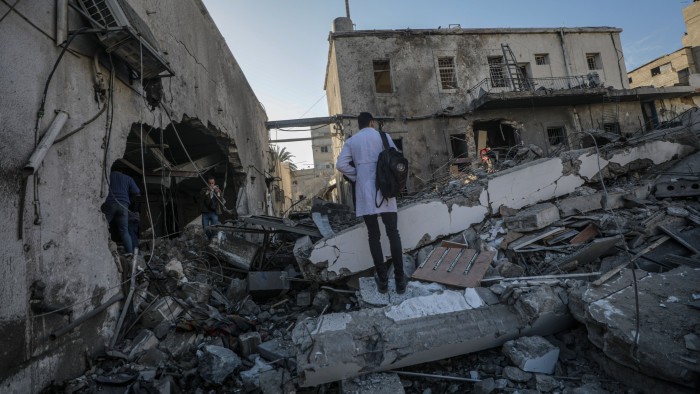Unlock the Editor’s Digest for free
Roula Khalaf, Editor of the FT, selects her favourite stories in this weekly newsletter.
Israel bombed one of Gaza City’s main functioning hospitals in the early hours of Sunday, after the country’s defence minister said its forces would expand their new offensive in the shattered Palestinian enclave.
The Diocese of Jerusalem said the strike on the Al Ahli hospital, which is run by the Anglican Church, had demolished a two-storey laboratory and damaged the pharmacy and emergency department.
It added that before the strike — which took place on the Christian festival of Palm Sunday — Israeli forces had given the patients, staff and displaced people sheltering in the hospital “a mere 20 minutes” to vacate the premises, and that one patient had died during the evacuation.
“The Diocese of Jerusalem is appalled at the bombing of the hospital now for the fifth time since the beginning of the war in 2023,” the Diocese said.
The Israeli military alleged that the hospital was being used as a command and control centre by Hamas, and said that it had taken steps to minimise harm to civilians before carrying out the strike.
In the wake of the strike, which temporarily forced the hospital to stop operating, the Gaza health ministry said three other hospitals were still providing services to Gaza City. That included the Shifa medical complex, much of which was destroyed during a raid by Israeli forces last year.
The bombing came a day after Israel’s defence minister Israel Katz said the renewed offensive would “soon expand vigorously to additional locations throughout most of Gaza”, and that Israeli forces had established a buffer zone cutting off the southern city of Rafah from the rest of the enclave.
He also repeated his calls for the local population to turn on Hamas and free the Israeli hostages still held by the militant group, adding that this was the “only way to stop the war”.
Israel broke a two-month-old ceasefire with Hamas last month and cut off supplies of food, fuel, medicine and humanitarian aid to the 2.2mn people living in the strip. Officials have pledged to continue the fighting until Hamas had been destroyed and the 59 hostages still being held in Gaza — fewer than half of whom are still thought to be alive — have been freed.
UN officials and aid groups have warned that the renewed fighting and full-on siege have intensified the catastrophic humanitarian conditions in Gaza.
The World Food Programme said last month that the siege had put “hundreds of thousands of people in Gaza . . . at risk of severe hunger and malnutrition” and that the 25 bakeries it supported in Gaza had all been forced to shut down because of a lack of fuel and flour.
Israel’s offensive has killed more than 50,000 people in Gaza, according to Palestinian officials, as well as displacing most of its inhabitants — many of them multiple times — and reducing much of the strip to rubble.
Israel launched the offensive in response to Hamas’s October 7 2023 attack on Israel, during which militants killed 1,200 people, according to Israeli officials, and took 250 hostage.
Read the full article here




